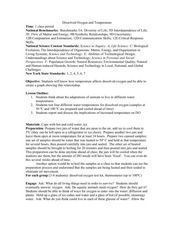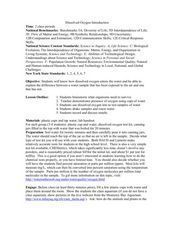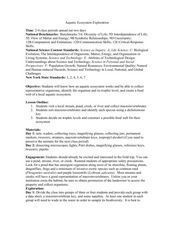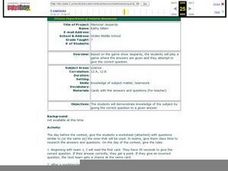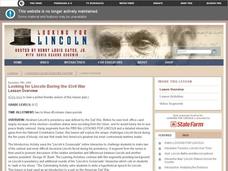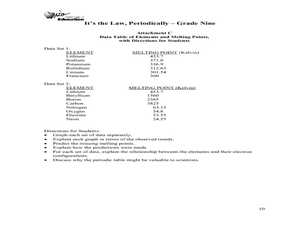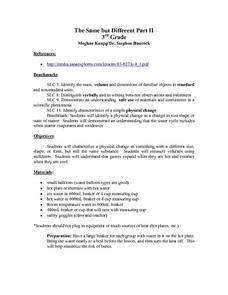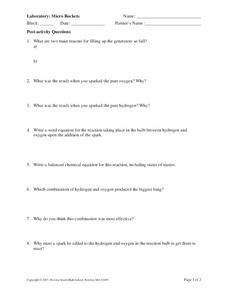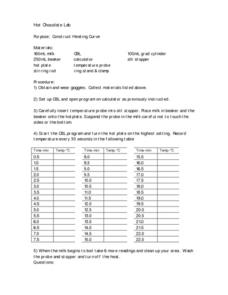Curated OER
Dissolved Oxygen and Temperature
Students are shown how temperature affects dissolved oxygen and they create a graph showing this relationship. They think about the adaptations of animals to live in different water temperatures. Students test four different water...
Curated OER
Dissolved Oxygen Introduction
Learners are shown how dissolved oxygen enters the water. They are taught the difference between a water sample that has been exposed to the air and one that has not. Students brainstorm what organisms need to survive. They use dissolved...
Curated OER
Aquatic Ecosystem Exploration
Learners visit a local stream, pond, creek, or river and collect macroinvertebrates. They sort macroinvertebrates and identify each species using a dichotomous key. Students decide on trophic levels and construct a possible food web for...
Curated OER
Where Life Is Too Short
Students predict how a pandemic would affect aspects of South Africa's society. In this world issues and geography instructional activity, students read a letter outlining the problems affecting South Africa. Students discuss and analyze...
Curated OER
Mammal Jeopardy
Seventh graders play a jeopardy like game using information about mammals. Before beginning the game, they complete a worksheet with questions similar to ones that are to be used during the competition. They answer more difficult...
American Chemical Society
Condensation
It's time to break the ice! If you are doing all of the lessons in the unit, children have already seen that increasing heat increases the rate of evaporation, but is the opposite true? Does decreasing temperature cause more condensation...
American Chemical Society
Exploring Moisture on the Outside of a Cold Cup
As a stand-alone or as part of the intended unit, this is a valid investigation of what causes condensation to occur. By limiting the amount of air around a cold cup of water and comparing it to one out in the open, they find that...
Curated OER
Looking for Lincoln During the Civil War
Eleventh graders examine the presidency of Lincoln. In this American History activity, 11th graders watch various videos on Lincoln and the Civil War. Students read and answer questions.
Curated OER
Water Cycle Activity
Learners build a model and observe the cycle of evaporation and condensation that occurs in the water cycle. They see how the water cycle works, such as water condensing on the side of the jar and drops precipitating into rain that...
Cornell University
Chemical Reactions
Investigate the Law of Conservation of Mass through a lab exploration. Individuals combine materials to initiate chemical reactions. They monitor for signs of reactions and measure the masses before and after the reactions for...
Curated OER
Word Families
First graders listen as they are read a book containing exmaples of word families, they listen for rhyming words. They focus on word families, words that have rhyming sounds and share the same spelling patterns. Pupils work in small...
Curated OER
It's the Law: Periodically
Ninth graders examine the Periodic Table. In this element lesson, 9th graders observe the chemical reactivity of elements. They graph the properties and discuss the trend in the group and period of elements. The students use math to...
Curated OER
Just Off Mainstreet by Elmaz Abinader
Eighth graders read writings from Elmaz Abinader. For this author analysis lesson students read an essay from Abinader and discuss the story "Just Off Mainstreet." Students re-read the text and complete close reading activities.
University of California
Hot! Hot! Hot!
Calories are not tiny creatures that sew your clothes tighter every night, but what are they? A science lesson, presented at multiple levels, has learners experiment with heat, heat transfer, and graph the function over time....
Curated OER
The Same, But Different Part II
Learners characterize a physical change as something that changes to a different size, but retains its basic substance. They measure volumes using milliliters, and perform an experiment that proves that gases expand when hot and contract...
Curated OER
Gases and Plasmas
Young scholars determine what plasma is and why the sun is made up of plasma. They recognize situations where plasmas are found in nature and made by man. They discuss why the sun is a huge ball of plasma and if there are different...
Curated OER
The Water We Drink
Third graders relate that the quality of their drinking water is subject to the condition of the environment and water found in streams and creeks in their community. They track the travel of a wad of paper from a student's desk to a...
Curated OER
Laboratory: Micro Rockets
If you know how to employ the exothermic reaction between hydrogen gas and oxygen gas to make a miniature rocket, then this worksheet is a fabulous lab sheet for your chemistry charges. First, they observe a spark in pure oxygen and one...
Curated OER
Scientific Method Experiment: Factors Affecting How Ice Melts
Students demonstrate the scientific method by conducting an ice cube melting experiment. They make predictions and observations, and conclude what factors make ice melt more slowly or quickly than normal.
Curated OER
Sometimes, solid + liquid = gas
Third graders experiment with common household liquids and solids. In this chemical reaction lesson plan, 3rd graders discuss phase changes and experiment to find other ways to create gases. They use water, vinegar, lemon juice, flour,...
NorthEast Ohio Geoscience Education Outreach
Density and Pressure of a Hot Air Balloon
Using a dry cleaner bag and a blow dryer, create a hot air balloon! The materials list suggests obtaining one dry cleaner bag per student, but since this is probably inconvenient, consider doing this as a demonstration during a activity...
Curated OER
How Can You Tell One Clear Gas From Another?
Fifth graders perform experiments to determine the identity of an unknown gas sample. In this chemistry lesson, 5th graders fill balloons with air, oxygen, hydrogen, and carbon dioxide. They use mass and reactivity to identify the gases.
Curated OER
Is it a solid or liquid?
Students review the vocabulary terms solid and liquid. They also review that adjectives tell what kind, which one, and how many. The teacher introduces a "Oobleck" after reading "Bartholomew and the Oobleck" by Dr. Seuss. The students...
Curated OER
Hot Chocolate Lab
Students wear goggles and collect materials and then set up computer program to use the temperature probes. They insert the probe into the milk recording temperature every 30 seconds and then record the data on the table.
